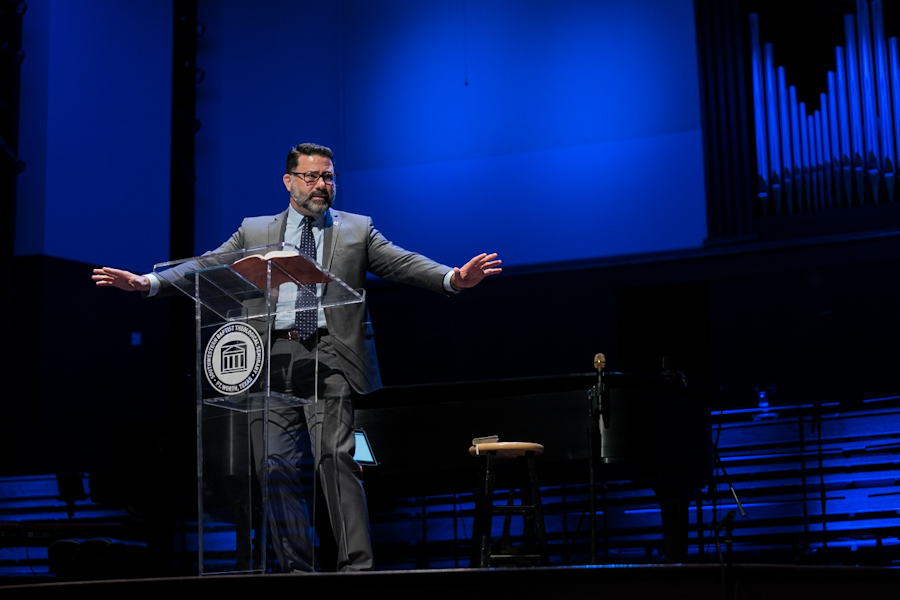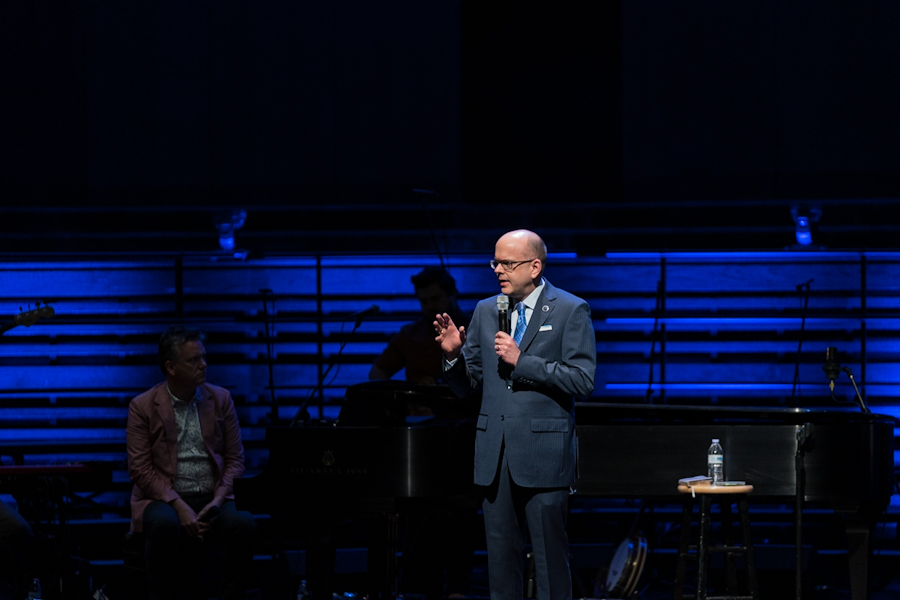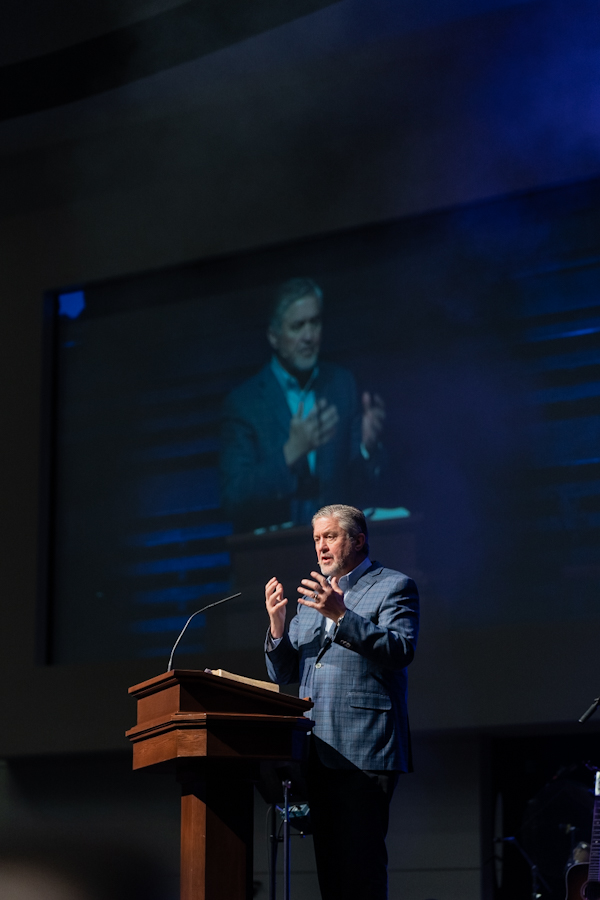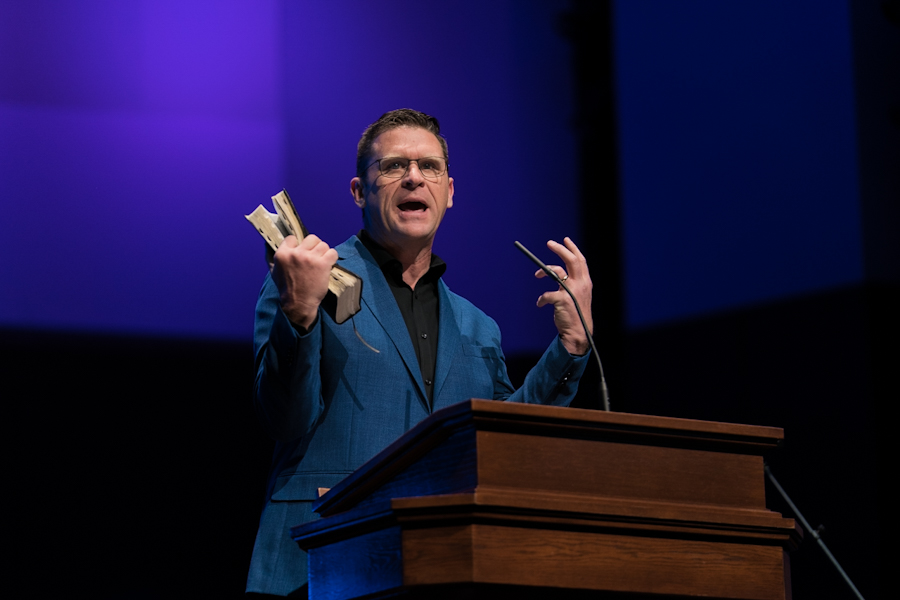Ministry Now Conference encourages pastors, church leaders to build ministries on Word of God


Southwestern Baptist Theological Seminary and Texas Baptist College hosted its first Ministry Now Conference March 22-24, featuring eight plenary session speakers who spoke to the role and health of the church amid a changing cultural context. Two micro-session speakers offered practical ideas for church ministry, while conference participants were also equipped through 27 breakout sessions led by seminary and college faculty and others who provided tools for pastors and ministry leaders.
The conference allowed participants to “look at and talk about ministry now and ministry moving forward in an incredibly changing, complex, complicated world that desperately needs the hope found only in Jesus Christ,” said Adam W. Greenway, president of Southwestern Seminary and TBC, in his welcome to conference attendees.
Worship was led by Keith and Kristyn Getty, internationally recognized hymn writers, and Matt Boswell, hymn writer and founding pastor of The Trails Church in Celina, Texas. Southwestern Singers, Cowden Hall Band, and the TBC Band also joined the musical guests in leading worship. Keith Getty and Boswell also met with students in the School of Church Music and Worship to talk about worship leadership and ministry.

Juan Sánchez
Sánchez, pastor of High Pointe Baptist Church in Austin, Texas, and associate professor of theology in the School of Theology at Southwestern Seminary, shared principles of a healthy church as given in Ephesians 4:10-16.
“A healthy church is built on the Word of God that it might look like the Son of God for the glory of God,” Sánchez said. “This is God’s purpose for us.”
Sánchez noted healthy churches have a structure of discipleship based on Jesus as the foundation. The goal of discipleship is to help people to grow to look more like Christ, while having a ministry of discipleship that encourages believers to speak the Word of God to each other, he said.
“A culture of discipleship is a culture where every part is working together, every ligament and every joint,” Sánchez said. “The pastors are preaching the Word. The congregation is receiving the Word and the members are sharing His Word–speaking His Word to one another in love until we all look more and more like Jesus.”
O.S. Hawkins
Hawkins, president emeritus of Guidestone Financial Resources and two-time Southwestern Seminary graduate, identified five characteristics of the current generation while reminding conference attendees “they don’t know anything about the Word of God and yet this is our commission to reach them in ministry now.”
Hawkins explained the current generation is searching for a meaningful relationship in life, seeking immediate gratification, wanting something for nothing, searching for guilt-free living, and thirsting for prosperity. However, he said, each of the characteristics can be met in Jesus Christ as outlined in Ephesians 1:7.
“In this culture we’re trying to reach, their basic problem is not biological or educational or psychological or economic,” Hawkins said. “It is a sin problem. And no one else has the answer in ministry now that we do.”

Adam W. Greenway
“There is something significant about tearing down walls,” said Greenway.
Preaching from Acts 10, Greenway noted that Peter was “deeply perplexed” by the vision he saw that included unclean animals and a command from God to eat. God told Peter, a Jew by heritage who did not eat unclean animals, “What God has made clean, do not call” unclean. The change in perspective was “shaking him to the core of his being,” Greenway said.
Correlating Peter’s experience with the modern-day confrontation of wrong perspectives, Greenway said, “The challenge is at times that the enemy is often far too effective in wanting us to be people who instead of looking to move beyond our prejudices, our wrong traditions, our sinful habits—that we want to find ways to perpetuate what we need to evacuate.”
“When did we lose, as a people, the desire to want to believe the best about those in our own tribe?” Greenway asked. “And when did we succumb to the idea that we glorify God the most when we find every reason to label, to disparage, and to build walls?”
Greenway observed Peter began to understand “God doesn’t show favoritism” and through Christ Jesus, “God is the One who brings us together.”
Marcus D. Hayes
Hayes, lead pastor of Crossroads Baptist Church in The Woodlands, Texas, since 2020, challenged leaders to examine how they “are going about” doing leadership based on Jesus’ interaction with the Samaritan woman in John 4.
“Leadership is not about necessarily the leader; it is about those of whom the leader is called to lead,” said Hayes, a 2017 Master of Arts in Theological Studies graduate of Southwestern Seminary.
Noting Jesus was intentional about passing through Samaria on His way to Galilee, Hayes said, “Jesus embodied Kingdom purpose, therefore we must embody Kingdom purpose.”
Observing that Jesus, a Jewish man, went through the Samaritan region that was usually avoided by Jews because of their dislike of the people, Hayes said Jesus challenges today’s leaders because “we cannot bypass the Samarias of our context. We must go through the Samarias of our context.”
Hayes also noted Jesus embodied Kingdom compassion and Kingdom power in His interaction with the Samaritan woman.
“Kingdom purpose, Kingdom compassion leads to Gospel power,” Hayes concluded. “The Gospel still works. Don’t try to fabricate it. Don’t try to change it. Don’t try to flip it up. Don’t do nothing.”

Steve Gaines
“I believe that relationships are what God has called us to be,” said Gaines, who has served as the senior pastor of Bellevue Baptist Church in Memphis, Tennessee, since 2005.
Gaines, a two-time Southwestern Seminary graduate and president of the Southern Baptist Convention from 2016-2018, provided six principles for healthy ministry, beginning with loving the Lord.
“If you want to do good in ministry, you’ve got to love the Lord,” Gaines said, noting a believer’s primary relationship is with God. He challenged participants to spend time reading, studying, and memorizing Scripture, while also praying and being in the presence of God in worship services.
“Our worship services are about God,” Gaines said. “This is not a platform from which we perform to the audience. You are not the audience. I’m not the audience. God is the audience in a worship service.”
Gaines also told participants to love their family, church family, lost people, discipleship relationships, and themselves. However, he concluded, a believer’s first ministry is to God.
“Jesus is your number one ministry,” he said. “Love Him. Love Jesus. … You can’t love Him too much.”
Donna Gaines
Speaking in the first micro session, Gaines said, “We as believers need to be running into our cities with the hope of the Gospel and the care that comes with loving Christ and loving our neighbor.” She is the founder of ARISE2Read and women’s ministry leader and author and wife of Steve Gaines, pastor of Bellevue Baptist Church in Memphis, Tennessee.
Gaines spoke of the genesis and impact of ARISE2Read in the Greater Memphis area. The non-profit was founded in 2012 through “Bellevue Loves Memphis,” an intentional outreach of Bellevue Baptist Church to minister to their home city by meeting practical needs in the community. Gaines, a trained special education teacher, had been tutoring elementary-aged children in Binghampton, one of the city’s “most impoverished” areas. Following a time of prayer, she sensed God leading her to adopt inner-city schools in the city and “focus on literacy” and “getting Bible clubs on the school campuses,” she explained.
The volunteer coordinator within the Memphis school system had been given the “mandate” to “increase the number of faith-based organizations that adopt schools,” Gaines said. Since adopting its first school, ARISE2Read has 1,200 volunteers in 41 Memphis-area elementary schools who help children in the area of literacy while also sharing the Gospel through afterschool Bible clubs. The organization has grown to serve children in 14 states and several countries, Gaines noted.

Noe Garcia
“You will find out in ministry that the most difficult heart you will ever have to shepherd is your own,” said Garcia, who has pastored North Phoenix Baptist Church since 2016. He explained the difficulty is “because you will be tempted to disobey God in order to get affirmation from man.”
Garcia, who shared his personal struggles and battles while serving in ministry, challenged conference participants to “humble yourself or be humbled.”
Preaching from 2 Corinthians 1:8-9, Garcia noted the “afflictions” the apostle Paul mentions in his letter to the church at Corinth were external evils, calamities, persecution, and “having to dodge for his life so that he can preach the Gospel.”
Garcia noted Paul continued sharing the Gospel despite persecution but did so as he depended upon the Lord. He encouraged leaders to follow the apostle’s example and rely on the Lord’s strength and power.
“There is no substitute for the power of God,” Garcia said. “You cannot fake it and you cannot fabricate it. The equation is a broken soul sitting before a wonderful Savior.”
Jack Graham
Preaching from 1 Corinthians 15:58, and Paul’s encouragement to “always abound in the work of the Lord,” Graham said ministry leaders have been “entrusted” with the work of ministry.
Graham, who has served as senior pastor of Prestonwood Baptist Church in Plano, Texas, since 1989, and was president of the Southern Baptist Convention, 2002-2004, encouraged young ministry leaders to “keep going” in ministry by remembering “the reality of the risen Christ” who lives in them.
“The ministry that is authentic and robust and resilient is empowered by His Spirit,” Graham observed.
Graham also said being “steadfast” provides the momentum for ministry as “there is no room for laziness in the ministry. There’s no room for coasting for the Christian because God has called us.”

Matt Carter
Encouraging pastors to preach according to the authority and sufficiency of the Word of God, Carter said, “it and it alone has authority.”
Carter, a 2006 Southwestern Seminary Master of Divinity graduate who has served as the lead pastor of Sagemont Church in Houston, Texas, since 2020, observed the apostle Paul wrote to the church at Corinth that he did not preach with superiority of speech or human wisdom, but instead he preached “Jesus Christ and Him crucified.”
Carter said the message of the Gospel was the central aim of Paul’s teaching.
“When you teach, somebody is going to be the star of that sermon,” Carter said. “And it is either going to be Jesus or it going to be you. … Is the star of your teaching going to be Jesus or is it going to be you?”
Carter encouraged pastors to focus on preaching God’s Word as he observed, “If there’s ever been a time in our lives where our people’s faith needs to rest not on man’s wisdom, but the power of God, it’s right now.”
Michael Criner
Examining multigenerational ministry for pastors and teachers, Criner said, “all of us long to have our messages connect with other people.”
Criner, who serves as the senior pastor of Rock Hill Baptist Church in Brownsboro, Texas, provided five tips for pastors and teachers to aid in helping their messages “spread” with their learners in the second micro session of the conference. He encouraged teachers of God’s Word to think beyond themselves by thinking of people 10 years older and 10 years younger than themselves as they teach. Criner also encouraged leaders to be themselves as they teach, rather than taking on the characteristics of another.
Criner said it is important for pastors to “befriend” the people in the church, while also showing people the glorious deeds of God.
“At the heart of Biblical preaching is … men who have seen great things in the Bible, savor what they have seen, and then they stand before other people sharing what they saw,” Criner said. “Have you savored God’s Word? If you don’t savor it, it won’t spread.”
Finally, Criner encouraged pastors to “be kindled” personally by God’s Word.



